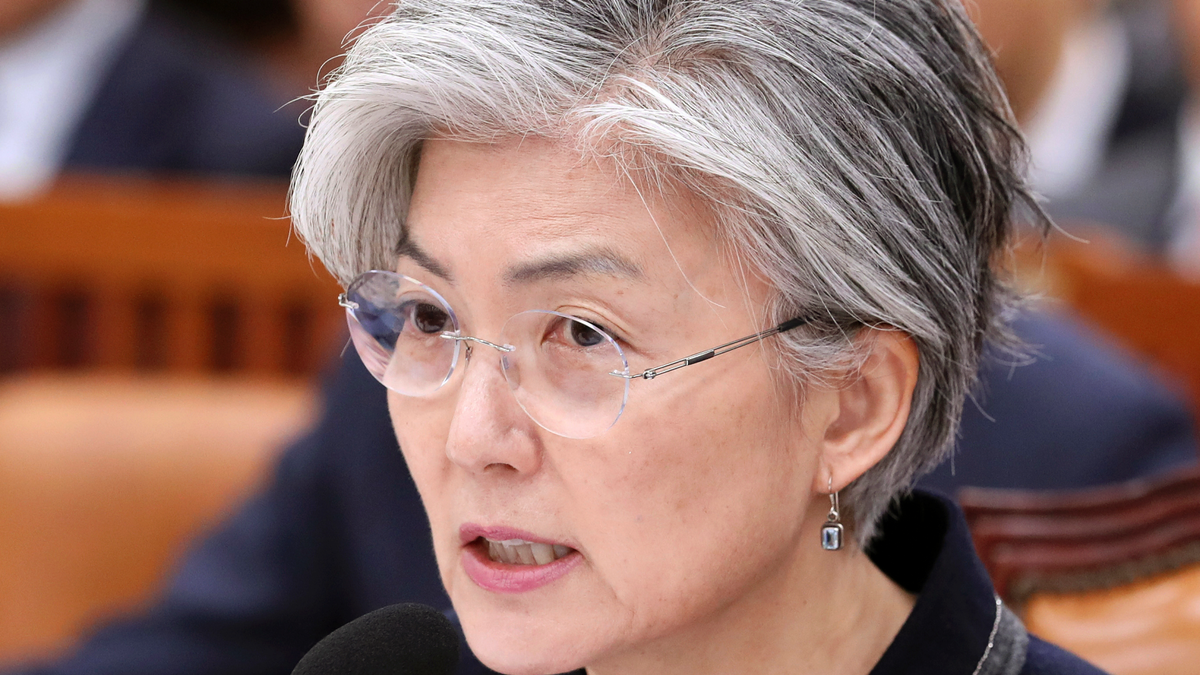
South Korean Foreign Minister Kang Kyung-wha answers a lawmaker's question at the National Assembly in Seoul, South Korea, Thursday, Nov. 8, 2018. Kang quoted U.S. officials as saying that it was North Korea that canceled a meeting this week between U.S. Secretary of State Mike Pompeo and a senior North Korean official on nuclear issues. (Kim Ju-hyung/Yonhap via AP)
SEOUL, South Korea – South Korea's foreign minister said Thursday that U.S. officials told Seoul that it was North Korea that canceled nuclear talks this week between U.S. Secretary of State Mike Pompeo and a senior North Korean official.
Foreign Minister Kang Kyung-wha provided no reason, aside from "busy schedules," for why North Korea canceled the meeting set for Thursday in New York that was meant to discuss ridding the North of its nuclear weapons and setting up a second summit between U.S. President Donald Trump and North Korean leader Kim Jong Un.
But some analysts say a last-minute cancellation — a familiar North Korean tactic — could be aimed at pressuring the United States to agree to a quick Trump-Kim summit because the North thinks it can win major concessions from Trump that lower-level U.S. officials might try to block. The U.S. president has recently appeared to be slowing the pace of diplomacy with North Korea amid signs that Kim is lagging behind in his supposed promise to denuclearize.
Before this week's cancellation, Trump said he wouldn't play a "time game" with the North over a denuclearization deal, while his national security director, John Bolton, said a second Kim-Trump summit won't happen until 2019.
North Korea has yet to comment on the cancellation.
Trump and Kim held a highly choreographed summit in June in Singapore, where they announced aspirational goals for a nuclear-free Korean Peninsula without describing how and when it would occur.
But North Korea has since insisted that U.S.-led sanctions against it should be lifted before there will be any progress in nuclear negotiations. This has fueled doubts about whether Kim will ever deal away a nuclear program he may see as his strongest guarantee of survival. Washington says the sanctions will remain until North Korea takes concrete steps toward irreversibly and verifiably relinquishing its nuclear weapons.
Many officials in the U.S. administration want to take time in setting up a summit because they're trying to get something more substantial after widespread criticism that Trump made large concessions to Kim in the first summit without getting much in return, said Park Hyeong-jung, an analyst from the Korea Institute for National Unification in Seoul.
This would require that the U.S. and North Korea hammer out details in lower-level talks about what can be exchanged at the next summit, but the cancellation of the meeting between Pompeo and Kim Yong Chol indicates that the two sides remain far apart, Park said.
Critics say Trump's decision to start off his North Korean diplomacy with a leaders' summit, instead of building upward from lower-level talks, bestowed legitimacy on the North before it took any meaningful steps toward denuclearization. After his June meeting with Kim, Trump raised security jitters in Seoul by abruptly canceling major U.S. military exercises with South Korea which North Korea had termed invasion rehearsals.
"For North Korea, there has never been a U.S. president like Trump," Park said. "He doesn't ask too many questions or dig too much into details. The North simply got what it wanted the last time."
Foreign Minister Kang told lawmakers she planned to discuss the matter with Pompeo over the phone. South Korea's presidential office earlier said that the meeting's postponement wouldn't affect the momentum of talks between the U.S. and North Korea.
"We were notified by the United States that North Korea explained that (the meeting) should be postponed because both sides have busy schedules," Kang said. "I think it would be excessive to read too much into the postponement of the meeting."
Trump told reporters at the White House that the United States is "in no rush" and that the meeting between Pompeo and Kim Yong Chol would be rescheduled.
U.S. State Department spokesman Robert Palladino said the postponement was "purely a scheduling issue" but refused to elaborate. He did not provide a straightforward answer when asked whether the discord over sanctions has made it more difficult to set up meetings.
"Timing, timing," Palladino said. "This has to do with timing as a matter — we're talking about scheduling. And I'll leave it at that."
Seoul has worked hard to revive nuclear diplomacy between the U.S. and North Korea that has reduced war fears among South Koreans following a provocative run in North Korean weapons tests and Trump's threats of military action last year.
Kim Jong Un shifted to diplomacy early this year and has held three summits with South Korean President Moon Jae-in. North Korea's Foreign Ministry last week criticized the United States for its continued support of sanctions and hinted it may resume nuclear development if the measures aren't lifted.









































